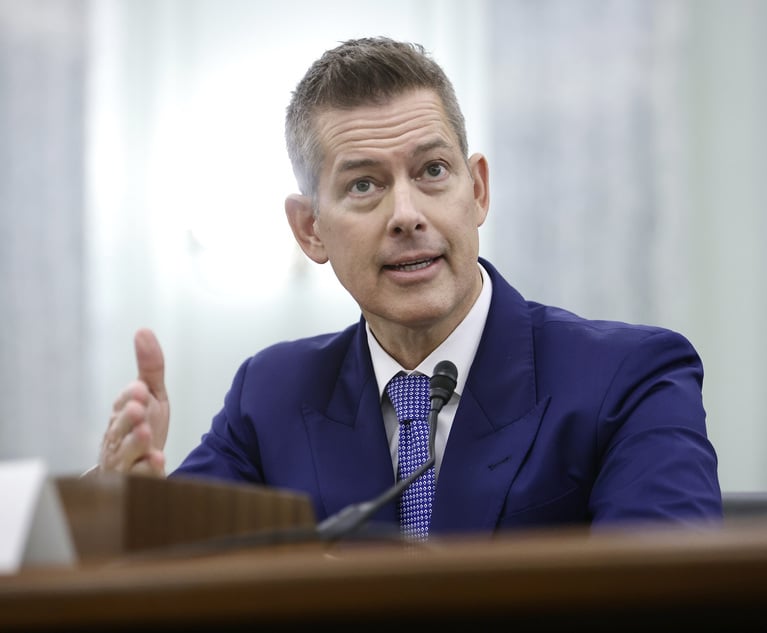Labor & Employment Digest: October 2015
Cybersecurity issues are a hot topic in legal and compliance circles, but, even as companies turn their attention to addressing these genuine concerns, other problems crop up like a game of whack-a-mole. The labor and employment legal landscape changes almost as fast as the privacy and data security space, so...
September 30, 2015 at 08:00 PM
11 minute read
Cybersecurity issues are a hot topic in legal and compliance circles, but, even as companies turn their attention to addressing these genuine concerns, other problems crop up like a game of whack-a-mole. The labor and employment legal landscape changes almost as fast as the privacy and data security space, so L&E attorneys must keep up with matters ranging from whistleblowing to the FCRA. Here are some thoughts about current labor and employment trends from outside experts.
Disney World unfair labor practice charge
According to news reports, on June 5, a labor union representing Disney World character performers filed an unfair labor practice charge protesting the alleged chilling effect of a company policy forbidding performers from publicly disclosing which characters they portray. The irony is unavoidable, especially to any employer who has been targeted by the National Labor Relations Board's (NLRB) highly imaginative campaign to rid the working world of dormant unfair labor practices lurking in the wording of handbooks and policies. A Mickey Mouse ruling is inevitable.
—Keith H. McCown, partner (Boston), Morgan, Brown & Joy LLP
Employers would be wise to consider a change in approach to whistleblower risk-management
In recent years, Congress has enacted or expanded whistleblower protections under more than 30 statutory schemes affecting employers of all sizes and in various industries. As a result, many employers have dramatically changed their whistleblower risk-management approach. Best practices now include using multi-disciplinary management teams composed of legal, HR, compliance and risk management personnel to respond to and resolve whistleblower complaints; providing ombudsman support services to whistleblowers; and conducting independent review of all proposed adverse employment actions against known whistleblowers prior to implementation. Such practices can significantly reduce the number of whistleblower retaliation claims.
—Mary E. Pivec, partner (Washington, DC), FordHarrison LLP
On joint employers
The NRLB's recent decision in Browning-Ferris Industries of California v. Sanitary Truck Drivers has fundamentally altered the standard for determining whether businesses are “joint employers” of the same employees. The previous standard focused on whether Business A exercised direct control over Business B's employees. Now, “joint employer” status may exist where Business A has authority to control essential terms and conditions of Business B employees' employment — even if Business A exercises this authority only indirectly or not at all. Many business relationships — including lessor-lessee, franchisor-franchisee and contractor-subcontractor — could be impacted by the new standard. Therefore, companies should evaluate their relationships to identify what control, direct or indirect, they may possess over the terms and conditions of other businesses' employees.
—Elizabeth F. Mason, Esq. partner (Boston) Bernkopf Goodman LLP
FCRA violations
The surge of class actions against employers for Fair Credit Reporting Act (FCRA) violations is largely due to the availability of statutory damages that can reach up to $1,000 per class member where “willfulness” is shown, even where no injury exists. At the same time, district courts are beginning to provide guidance on the nuanced issues these lawsuits raise, with a number of recent decisions treating FCRA willfulness as a question of law in class actions against employers. An understanding of these decisions will aid employers in reviewing their compliance with FCRA obligations and in forming their litigation strategy.
—Galit Knotz, counsel (Los Angeles) Akin Gump
Cybersecurity issues are a hot topic in legal and compliance circles, but, even as companies turn their attention to addressing these genuine concerns, other problems crop up like a game of whack-a-mole. The labor and employment legal landscape changes almost as fast as the privacy and data security space, so L&E attorneys must keep up with matters ranging from whistleblowing to the FCRA. Here are some thoughts about current labor and employment trends from outside experts.
Disney World unfair labor practice charge
According to news reports, on June 5, a labor union representing Disney World character performers filed an unfair labor practice charge protesting the alleged chilling effect of a company policy forbidding performers from publicly disclosing which characters they portray. The irony is unavoidable, especially to any employer who has been targeted by the National Labor Relations Board's (NLRB) highly imaginative campaign to rid the working world of dormant unfair labor practices lurking in the wording of handbooks and policies. A Mickey Mouse ruling is inevitable.
—Keith H. McCown, partner (Boston), Morgan, Brown & Joy LLP
Employers would be wise to consider a change in approach to whistleblower risk-management
In recent years, Congress has enacted or expanded whistleblower protections under more than 30 statutory schemes affecting employers of all sizes and in various industries. As a result, many employers have dramatically changed their whistleblower risk-management approach. Best practices now include using multi-disciplinary management teams composed of legal, HR, compliance and risk management personnel to respond to and resolve whistleblower complaints; providing ombudsman support services to whistleblowers; and conducting independent review of all proposed adverse employment actions against known whistleblowers prior to implementation. Such practices can significantly reduce the number of whistleblower retaliation claims.
—Mary E. Pivec, partner (Washington, DC),
On joint employers
The NRLB's recent decision in Browning-Ferris Industries of California v. Sanitary Truck Drivers has fundamentally altered the standard for determining whether businesses are “joint employers” of the same employees. The previous standard focused on whether Business A exercised direct control over Business B's employees. Now, “joint employer” status may exist where Business A has authority to control essential terms and conditions of Business B employees' employment — even if Business A exercises this authority only indirectly or not at all. Many business relationships — including lessor-lessee, franchisor-franchisee and contractor-subcontractor — could be impacted by the new standard. Therefore, companies should evaluate their relationships to identify what control, direct or indirect, they may possess over the terms and conditions of other businesses' employees.
—Elizabeth F. Mason, Esq. partner (Boston)
FCRA violations
The surge of class actions against employers for Fair Credit Reporting Act (FCRA) violations is largely due to the availability of statutory damages that can reach up to $1,000 per class member where “willfulness” is shown, even where no injury exists. At the same time, district courts are beginning to provide guidance on the nuanced issues these lawsuits raise, with a number of recent decisions treating FCRA willfulness as a question of law in class actions against employers. An understanding of these decisions will aid employers in reviewing their compliance with FCRA obligations and in forming their litigation strategy.
—Galit Knotz, counsel (Los Angeles)
This content has been archived. It is available through our partners, LexisNexis® and Bloomberg Law.
To view this content, please continue to their sites.
Not a Lexis Subscriber?
Subscribe Now
Not a Bloomberg Law Subscriber?
Subscribe Now
NOT FOR REPRINT
© 2025 ALM Global, LLC, All Rights Reserved. Request academic re-use from www.copyright.com. All other uses, submit a request to [email protected]. For more information visit Asset & Logo Licensing.
You Might Like
View All


After Botched Landing of United Airlines Boeing 767, Unlikely Plaintiff Sues Carrier
5 minute read
DOT Moves to Roll Back Emissions Rules, Eliminate DEI Programs
Trending Stories
Who Got The Work
J. Brugh Lower of Gibbons has entered an appearance for industrial equipment supplier Devco Corporation in a pending trademark infringement lawsuit. The suit, accusing the defendant of selling knock-off Graco products, was filed Dec. 18 in New Jersey District Court by Rivkin Radler on behalf of Graco Inc. and Graco Minnesota. The case, assigned to U.S. District Judge Zahid N. Quraishi, is 3:24-cv-11294, Graco Inc. et al v. Devco Corporation.
Who Got The Work
Rebecca Maller-Stein and Kent A. Yalowitz of Arnold & Porter Kaye Scholer have entered their appearances for Hanaco Venture Capital and its executives, Lior Prosor and David Frankel, in a pending securities lawsuit. The action, filed on Dec. 24 in New York Southern District Court by Zell, Aron & Co. on behalf of Goldeneye Advisors, accuses the defendants of negligently and fraudulently managing the plaintiff's $1 million investment. The case, assigned to U.S. District Judge Vernon S. Broderick, is 1:24-cv-09918, Goldeneye Advisors, LLC v. Hanaco Venture Capital, Ltd. et al.
Who Got The Work
Attorneys from A&O Shearman has stepped in as defense counsel for Toronto-Dominion Bank and other defendants in a pending securities class action. The suit, filed Dec. 11 in New York Southern District Court by Bleichmar Fonti & Auld, accuses the defendants of concealing the bank's 'pervasive' deficiencies in regards to its compliance with the Bank Secrecy Act and the quality of its anti-money laundering controls. The case, assigned to U.S. District Judge Arun Subramanian, is 1:24-cv-09445, Gonzalez v. The Toronto-Dominion Bank et al.
Who Got The Work
Crown Castle International, a Pennsylvania company providing shared communications infrastructure, has turned to Luke D. Wolf of Gordon Rees Scully Mansukhani to fend off a pending breach-of-contract lawsuit. The court action, filed Nov. 25 in Michigan Eastern District Court by Hooper Hathaway PC on behalf of The Town Residences LLC, accuses Crown Castle of failing to transfer approximately $30,000 in utility payments from T-Mobile in breach of a roof-top lease and assignment agreement. The case, assigned to U.S. District Judge Susan K. Declercq, is 2:24-cv-13131, The Town Residences LLC v. T-Mobile US, Inc. et al.
Who Got The Work
Wilfred P. Coronato and Daniel M. Schwartz of McCarter & English have stepped in as defense counsel to Electrolux Home Products Inc. in a pending product liability lawsuit. The court action, filed Nov. 26 in New York Eastern District Court by Poulos Lopiccolo PC and Nagel Rice LLP on behalf of David Stern, alleges that the defendant's refrigerators’ drawers and shelving repeatedly break and fall apart within months after purchase. The case, assigned to U.S. District Judge Joan M. Azrack, is 2:24-cv-08204, Stern v. Electrolux Home Products, Inc.
Featured Firms
Law Offices of Gary Martin Hays & Associates, P.C.
(470) 294-1674
Law Offices of Mark E. Salomone
(857) 444-6468
Smith & Hassler
(713) 739-1250






